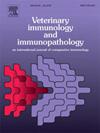埃及口蹄疫感染后热不耐受综合征牛的热应激和炎症基因表达上调、临床和血液生化变化
IF 1.4
3区 农林科学
Q4 IMMUNOLOGY
引用次数: 0
摘要
背景:本研究旨在证实埃及牛的热不耐受(HI)综合征与口蹄疫之间的关系,并描述奶牛的临床、血流变、生化和激素变化,以及热应激和慢性炎症相关基因的表达,以试图理解和解释急性口蹄疫恢复后与HI相关的病理生理变化。方法:选取17头HI病奶牛和10头表面健康奶牛。研究中的动物都接受了仔细的临床检查。采用酶联免疫吸附试验(ELISA),通过对口蹄疫病毒的中和抗体证实了HI奶牛先前对口蹄疫的影响。结果:热耐受不足、喘气、流涎、被毛干燥粗糙、虚弱、喂养不足、产奶量下降是HI奶牛最一致的临床表现。结论:热休克和炎症基因的表达上调以及激素失衡是流行地区控制HI的良好指标。本文章由计算机程序翻译,如有差异,请以英文原文为准。
Upregulation of heat stress and inflammatory genes expression, clinical and hemato- biochemical changes in cattle with heat intolerance syndrome following FMD infection in Egypt
Background
The present study was undertaken to confirm the association between heat intolerance (HI) syndrome and FMD in cattle in Egypt, and to describe the clinical, hematological, biochemical and hormonal alterations, and expression of heat stress and chronic inflammatory related genes in cows in an attempt for understanding and explanation of the pathophysiological changes associated with HI following recovery from acute FMD.
Methods
Seventeen HI affected cows and 10 apparently healthy cows were involved in this work. Animals in the study were subjected to careful clinical examination. ELISA Assay was performed to confirm the previous affection of HI cows with FMD via demonstration of neutralizing antibodies to FMDV.
Results
Lack of tolerance to heat, panting, salivation, dry rough coat, debility, inadequate feeding, reduced milk yield were the most consistent clinical findings in HI cows. Cows with heat intolerance syndrome demonstrated a significant reduction (P < 0.05) in RBCs count, hemoglobin concentration. PCV, MCV and MCHC. There was a significant leukocytosis, neutrophilia, lymphopenia, eosinopenia, monocytopenia and thrombocytopenia in HI cows in comparison with control. Heat intolerance syndrome revealed non-significant change in serum activities of liver enzymes, total bilirubin, total proteins, albumin, glucose, serum creatinine, urea and BUN. However, the serum total lipids, total cholesterol, triglycerides and triiodothyronine (T3) were significantly decreased. While thyroxine (T4) and cortisol levels were significantly increased (P < 0.05) in HI cows in comparison with control healthy cows with controls. In addition to, upregulation of HSP70, HSP90, HSF, IL33 and CASP3 genes expression (P < 0.05).
Conclusion
Upregulated expression of heat shock and inflammatory genes and hormonal imbalance serve as good index for managing HI in endemic regions.
求助全文
通过发布文献求助,成功后即可免费获取论文全文。
去求助
来源期刊
CiteScore
3.40
自引率
5.60%
发文量
79
审稿时长
70 days
期刊介绍:
The journal reports basic, comparative and clinical immunology as they pertain to the animal species designated here: livestock, poultry, and fish species that are major food animals and companion animals such as cats, dogs, horses and camels, and wildlife species that act as reservoirs for food, companion or human infectious diseases, or as models for human disease.
Rodent models of infectious diseases that are of importance in the animal species indicated above,when the disease requires a level of containment that is not readily available for larger animal experimentation (ABSL3), will be considered. Papers on rabbits, lizards, guinea pigs, badgers, armadillos, elephants, antelope, and buffalo will be reviewed if the research advances our fundamental understanding of immunology, or if they act as a reservoir of infectious disease for the primary animal species designated above, or for humans. Manuscripts employing other species will be reviewed if justified as fitting into the categories above.
The following topics are appropriate: biology of cells and mechanisms of the immune system, immunochemistry, immunodeficiencies, immunodiagnosis, immunogenetics, immunopathology, immunology of infectious disease and tumors, immunoprophylaxis including vaccine development and delivery, immunological aspects of pregnancy including passive immunity, autoimmuity, neuroimmunology, and transplanatation immunology. Manuscripts that describe new genes and development of tools such as monoclonal antibodies are also of interest when part of a larger biological study. Studies employing extracts or constituents (plant extracts, feed additives or microbiome) must be sufficiently defined to be reproduced in other laboratories and also provide evidence for possible mechanisms and not simply show an effect on the immune system.

 求助内容:
求助内容: 应助结果提醒方式:
应助结果提醒方式:


